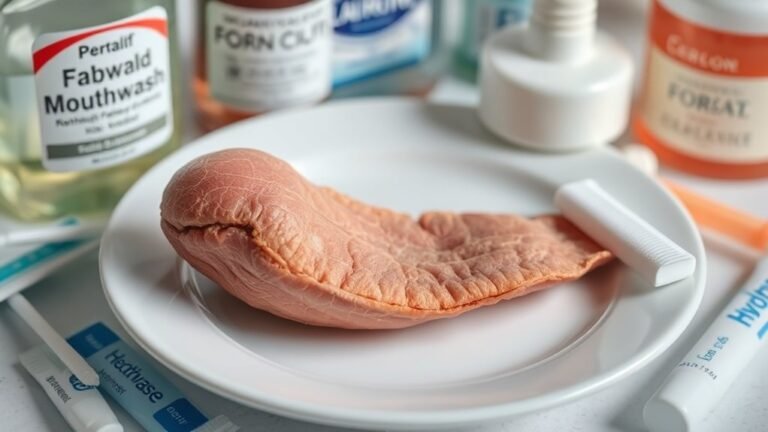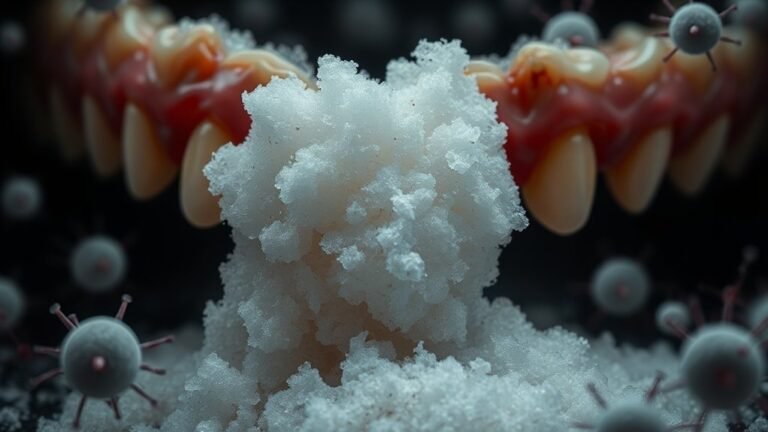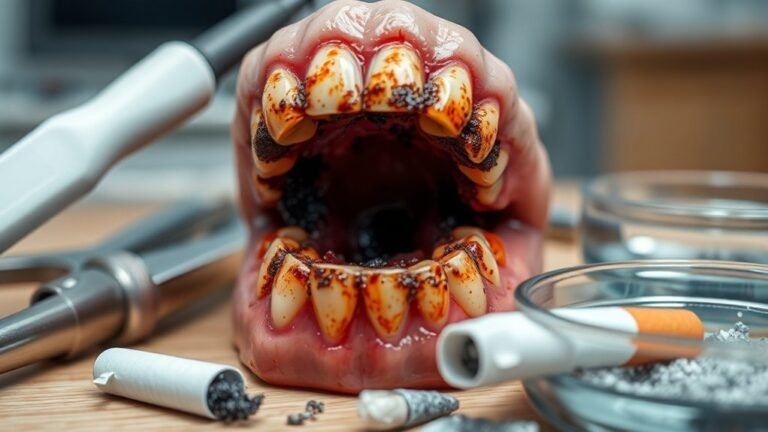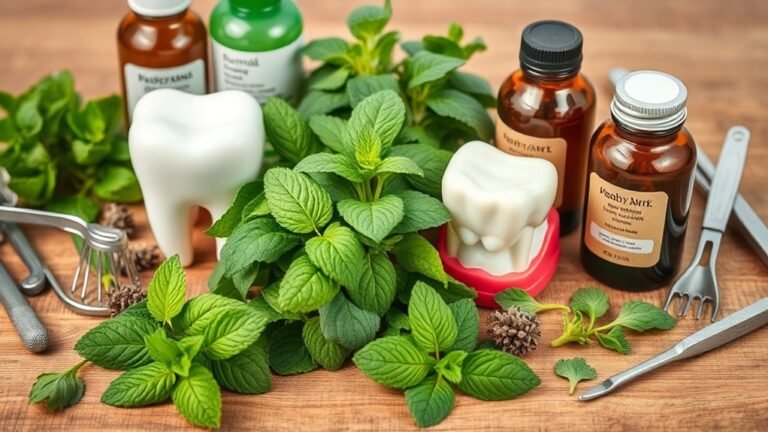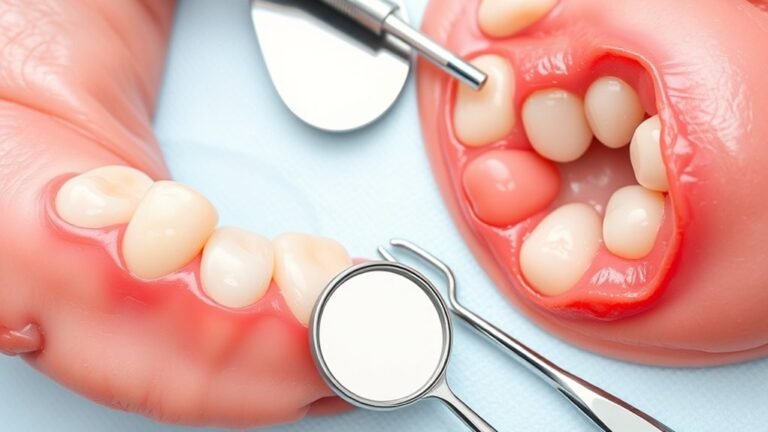How Do Dry Mouth Conditions Affect Oral Bacterial Balance and Infection Risk
Dry mouth, or xerostomia, disrupts your oral bacterial balance by decreasing saliva flow, which is essential for maintaining a healthy microbiome. This reduction allows harmful bacteria to thrive while beneficial bacteria struggle, promoting dysbiosis. Consequently, the risk of oral infections increases considerably. Without adequate saliva, the natural defense mechanisms weaken, leading to higher chances of cavities and gum disease. Understanding the factors contributing to this condition can help you manage its effects more effectively.
Key Takeaways
- Dry mouth reduces saliva flow, disrupting the natural balance between harmful and beneficial oral bacteria.
- A decrease in saliva allows harmful bacteria to flourish, increasing the risk of dysbiosis and oral infections.
- Insufficient saliva impairs antimicrobial functions, which are essential for controlling bacterial growth and preventing cavities.
- Increased bacterial overgrowth due to dry mouth heightens the likelihood of gum disease and tooth decay.
- Untreated dry mouth creates an unfavorable oral environment, promoting biofilm formation and long-term oral health challenges.
Understanding Dry Mouth: Causes and Symptoms
When you experience dry mouth, it’s essential to understand its underlying causes and symptoms, as this condition can greatly impact your oral health. Xerostomia, or dry mouth, often results from factors such as dehydration, medication side effects, or underlying health conditions like diabetes or Sjögren’s syndrome. Symptoms may include a persistent dry sensation, difficulty swallowing, and increased dental plaque. Research indicates that reduced saliva flow compromises the oral microbiome, increasing the risk for cavities and gum disease. By identifying the root causes of xerostomia, you can take proactive steps toward management, such as staying hydrated and consulting with healthcare professionals for potential treatment options. Recognizing these symptoms early can help mitigate their effects on your overall oral health.
The Role of Saliva in Oral Health
Saliva plays an essential role in maintaining oral health, acting as a natural defense mechanism against various dental problems. It contains antimicrobial agents that inhibit the growth of harmful bacteria, thereby supporting a balanced oral microbiome. When you experience salivary flow reduction, this protective effect diminishes, increasing your vulnerability to infections and cavities. Saliva also aids in the remineralization of tooth enamel, neutralizing acids produced by bacterial metabolism. In addition, it facilitates the clearance of food particles and debris, reducing plaque accumulation. By maintaining the best salivary flow, you not only promote a healthy oral environment but also enhance your overall oral hygiene. Consequently, understanding the significance of saliva is vital for preventing dental complications.
How Dry Mouth Disrupts Bacterial Balance
Dry mouth, or xerostomia, greatly disrupts the delicate balance of oral bacteria that is essential for maintaining oral health. When saliva production decreases, the natural saliva defense mechanism weakens, allowing harmful bacteria to proliferate. Saliva plays a vital role in neutralizing acids and providing antimicrobial properties, which help keep pathogenic bacteria in check. Without adequate saliva, beneficial bacteria struggle to thrive, leading to an imbalance that favors opportunistic pathogens. This shift can result in dysbiosis, where the overall microbial community becomes skewed, increasing the risk of oral health issues. Understanding how dry mouth disrupts oral bacterial balance is key to addressing potential complications and implementing effective preventive measures.
The Connection Between Dry Mouth and Oral Infections
A decrease in saliva not only disrupts the balance of oral bacteria but also considerably heightens the risk of oral infections. When saliva production diminishes, you face an increased chance of bacterial overgrowth, which can lead to various oral health issues. Saliva plays an essential role in maintaining oral hygiene by washing away food particles and neutralizing acids. Consequently, the lack of saliva can encourage the proliferation of harmful bacteria, leading to conditions such as:
- Gum disease
- Tooth decay
- Thrush
- Bad breath
- Oral ulcers
Understanding this connection is significant for anyone experiencing dry mouth. By recognizing the implications, you can take proactive steps to protect your oral health and mitigate the risk of infections that may arise from bacterial overgrowth.
Common Dental Issues Associated With Dry Mouth
When saliva production decreases, you may encounter several common dental issues that arise as a direct consequence of dry mouth. Reduced saliva impairs your oral hygiene, leading to an increase in dental caries and other complications.
| Dental Issue | Description |
|---|---|
| Dental Caries | Increased risk due to lack of protective saliva. |
| Gum Disease | Dry mouth can contribute to inflammation and infection. |
| Bad Breath | Decreased moisture leads to bacterial overgrowth. |
These issues highlight the crucial role saliva plays in maintaining oral health. Without adequate saliva, your mouth becomes more susceptible to harmful bacteria, ultimately increasing your risk for cavities and periodontal disease. Understanding these associations is essential for recognizing the importance of saliva in oral health management.
Strategies for Managing Dry Mouth
To effectively manage dry mouth, you should consider multiple strategies, including hydration techniques, saliva substitutes, and dietary adjustments. Evidence indicates that regular fluid intake and specific oral products can greatly alleviate symptoms. Additionally, certain foods and beverages can either exacerbate or relieve dryness, making dietary choices vital in your approach.
Hydration Techniques and Tips
How can you effectively manage dry mouth and improve your oral health? Prioritizing hydration is essential to combat mouth dryness and maintain oral bacteria balance. Here are some effective techniques to explore:
- Sip water frequently throughout the day to stay hydrated.
- Use a humidifier at night to add moisture to the air.
- Chew sugar-free gum or suck on sugar-free lozenges to stimulate saliva production.
- Avoid caffeinated and alcoholic beverages, as they can exacerbate dryness.
- Incorporate hydrating foods, like cucumbers and watermelon, into your diet.
Saliva Substitutes and Products
Numerous saliva substitutes and products are available to help manage dry mouth effectively. These solutions can mitigate the effects of salivary gland dysfunction, reducing infection risk and promoting oral health. Here’s a comparison of common options:
| Product Type | Key Ingredients | Benefits |
|---|---|---|
| Mouth Rinses | Xylitol, Fluoride | Moisturizes, protects teeth |
| Gels and Sprays | Carboxymethyl cellulose | Long-lasting moisture |
| Chewing Gum | Sugar-free xylitol | Stimulates saliva flow |
| Lozenge Tablets | Natural flavors | Soothes oral tissues |
Using these products can greatly improve your quality of life and maintain oral bacterial balance, ultimately lowering the risk of infection associated with dry mouth conditions.
Dietary Considerations for Relief
While managing dry mouth, dietary choices play a crucial role in alleviating symptoms and promoting oral health. A balanced diet can help maintain mucosa integrity, particularly for those with autoimmune diseases that increase the risk of dry mouth. Here are some dietary considerations to enhance your oral health:
- Drink plenty of water to stay hydrated.
- Incorporate moist foods, like soups and smoothies.
- Limit acidic and sugary foods that can exacerbate dryness.
- Choose sugar-free gum or mints to stimulate saliva production.
- Include omega-3 fatty acids and antioxidants to support mucosal health.
The Importance of Regular Dental Check-ups
Why should you prioritize regular dental check-ups? These appointments aren’t just about maintaining your smile; they play an essential role in your oral health, especially if you experience dry mouth. Regular dental cleanings help remove plaque and bacteria, which can otherwise contribute to infections and disrupt your oral bacterial balance. A dentist can also assess how dry mouth affects your immune defense against oral pathogens. Early detection of issues like cavities or gum disease allows for timely intervention, reducing the risk of complications. Furthermore, your dentist can recommend tailored strategies to manage dry mouth, ensuring ideal oral health. Prioritizing these check-ups is critical not only for prevention but also for maintaining a healthy environment in your mouth.
Long-term Implications of Untreated Dry Mouth
If you leave dry mouth untreated, you markedly heighten your risk for bacterial growth, tooth decay, and gum disease. The lack of saliva creates an environment where harmful bacteria thrive, leading to increased oral health issues. Monitoring these implications is essential for maintaining long-term oral health.
Bacterial Growth Increase
Untreated dry mouth, or xerostomia, substantially increases bacterial growth, leading to a host of long-term oral health issues. Reduced saliva production disrupts the oral environment, promoting the formation of bacterial biofilm. This biofilm can harbor harmful bacteria and contribute to systemic infections, while also creating conditions ripe for fungal infections.
Consider the following implications:
- Increased plaque accumulation due to biofilm
- Higher risk of periodontal disease
- Enhanced susceptibility to oral candidiasis
- Altered taste perception impacting nutrition
- Potential for systemic health issues linked to oral bacteria
Addressing dry mouth is essential to maintaining a balanced oral microbiome and reducing the risk of these complications over time.
Tooth Decay Risk
When saliva production decreases, the risk of tooth decay greatly escalates due to an imbalance in the oral environment. Saliva acts as a natural buffer against acidic bacteria, and its deficiency can lead to increased inflammation and heightened decay risk.
| Factors Contributing to Tooth Decay | Effects of Dry Mouth |
|---|---|
| Reduced remineralization | Higher acid levels |
| Increased bacterial growth | Accelerated enamel erosion |
| Diminished pH balance | Greater inflammation risk |
Without adequate saliva, harmful bacteria can proliferate, leading to cavities and further complications. Long-term untreated dry mouth can result in significant dental issues, necessitating proactive management strategies to maintain oral health and prevent tooth decay.
Gum Disease Development
The relationship between dry mouth and gum disease is significant, as a reduction in saliva not only increases the risk of tooth decay but also creates an environment conducive to periodontal issues. Saliva plays an important role in maintaining oral health by controlling plaque accumulation and balancing microbial populations. When dry mouth occurs, you may experience microbial dysbiosis, where harmful bacteria outnumber beneficial ones, leading to inflammation and gum disease.
- Increased plaque accumulation
- Higher levels of pathogenic bacteria
- Enhanced risk of gingivitis
- Accelerated progression to periodontitis
- Greater likelihood of tooth loss
Addressing dry mouth is essential to prevent these long-term complications and preserve your oral health. Regular dental visits and hydration strategies can help maintain balance in your oral microbiome.
Frequently Asked Questions
Can Dry Mouth Affect Taste Perception?
Yes, dry mouth can considerably affect taste perception. Reduced saliva leads to decreased taste bud stimulation, impairing your ability to taste flavors fully, which can alter your eating habits and overall enjoyment of food.
Are Certain Medications More Likely to Cause Dry Mouth?
Certain medications, like a drought in a desert, can greatly reduce saliva production, leading to dry mouth. Antidepressants, antihistamines, and blood pressure medications are commonly linked to this condition, impacting your oral health and overall well-being.
Does Age Influence the Severity of Dry Mouth Symptoms?
Yes, age does influence the severity of dry mouth symptoms. As you age, salivary gland function often declines, leading to increased dryness and discomfort, which exacerbates the condition’s impact on oral health and hygiene.
What Lifestyle Changes Can Help Alleviate Dry Mouth?
To alleviate dry mouth, you can stay hydrated, chew sugar-free gum, avoid caffeine and alcohol, use a humidifier at night, and consider saliva substitutes. These strategies help maintain moisture and improve oral health effectively.
Can Dry Mouth Lead to Systemic Health Issues?
Yes, dry mouth can lead to systemic health issues. Reduced saliva affects digestion and nutrient absorption, potentially increasing the risk of chronic conditions like diabetes and cardiovascular diseases. Staying hydrated and addressing the cause is essential.
Conclusion
In conclusion, dry mouth isn’t just a nuisance; it’s a silent saboteur of your oral health. By disrupting the delicate balance of oral bacteria, it increases your risk of infections and dental issues. Just as a garden needs water to thrive, your mouth relies on saliva for protection. Addressing dry mouth promptly can prevent a cascade of complications, highlighting the importance of proactive management and regular dental visits to maintain your oral well-being.

